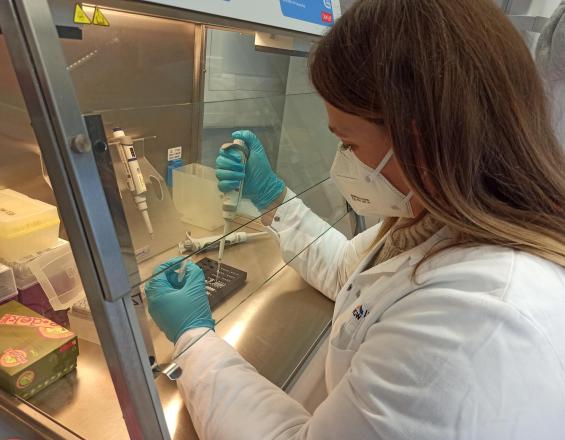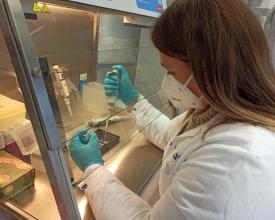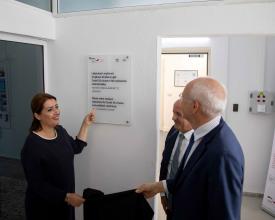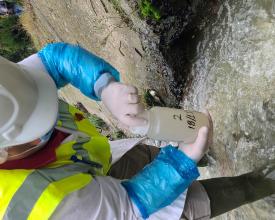
Early Warning System: Wastewater based monitoring on COVID-19, viruses, AMR, Albania

Systematic wastewater-based monitoring is another tool to complement conventional surveillance for public health policy decisions. It helps to recognise changes at an early stage and to follow-up pandemic developments . The concentration of SARS-CoV-2 RNA in wastewater showed the trends of COVID-19 infections in the population without individual testing. Working with all wastewater treatment plant operators in Albania, GIZ Water Programme initiated in collaboration with the German Technologie Zentrum Wasser (TZW), and the Agricultural University of Tirana (AUT), the development of a wastewater monitoring system on SARS-CoV-2, other viruses, and antimicrobial resistance (AMR). This laboratory is centrepiece for wastewater-based epidemiology in Albania.
Main challenge was to interlink partners from the water and health sectors to an intersectoral and inter-ministerial working group until the Early Warning System for public health became functional for the consultancy of the Albanian Government.
Context
Challenges addressed
Main challenge was to interlink partners from the water and health sectors to an intersectoral and inter-ministerial working group until the Early Warning System for public health became functional for the consultancy of the Albanian Government. To persuade decision makers of the benefit of wastewater based analyses and epidemiology was another challenge.
Location
Process
Summary of the process
The technical preconditions of the microbiological laboratory and specifically trained laboratory staff on the sensitive PCR-based detection methodology of viruses and AMR in wastewater and the close cooperation with water utilities for wastewater sampling are the basis for reliable data of the virus load. AMR is a growing threat to human and animal health. Analyses and interpretation of the data are presented in regularly reports from university experts to Albanian Government Technical Expert Committee for decision-making. Involved into the process of the Early Warning System is the inter-sectoral and inter-ministerial working group consisting of AUT, Public Health Institute, Ministry of Health, National Environmental Agency. The cooperation between AUT and TZW regarding knowledge transfer, data exchange and scientific research is perpetuated.
Building Blocks
Early Warning System - a multi-block building solution
The implementation of Albania’s early warning eystem on viruses and AMR is based on processes of enhancement local laboratory diagnostics, capacity development (laboratory planning, training), knowledge transfer and the facilitation of intersectoral and inter-ministerial cooperation.
- Early Warning System
- Facilitation inter-sectoral – inter-ministerial cooperation
- Enhancement local laboratory diagnostic: Research – sophisticated Technology – wastewater-based monitoring (epidemiology)
- Training
Enabling factors
Apart from international exchange and knowledge transfer, awareness of characteristics of the health and water sector and interfaces are relevant as well as the human factor to overcome silo-thinking and encouraging strong engagement. Trainings and exchange between skilled staff is elementary and the political will needed.
Lesson learned
Information, sensitisation and awareness rising for all institutions involved in the early warning system, well described win-win-situations, and a regular transparent communication as trust building process are the basis for the success. The time required for the implementation shouldn't be underestimated.
Facilitation inter-sectoral – inter-ministerial cooperation
The Early Warning System is structured on three levels: the scientific level consisting of the participating water and wastewater utilities as basis, the political level with the Public Health Institute and the policy and strategic level with the inter-sectoral and inter-ministerial exchange The later were facilitated and national and international cooperations with research institutes and universities assisted.
Enabling factors
Institutionalised communication and exchange are important for the intersectoral cooperation and collaboration. The political will for the implementation of the Early Warning System is elementary.
Lesson learned
The timeline plays an important role for the implementation and continuation of the early warning system, initiated by the COVID-19 pandemics.
Enhancement local laboratory diagnostic: Research – sophisticated Technology – wastewater-based monitoring (epidemiology)
The capacities of the Agricultural University Tirana's laboratories had been extended by the microbiological laboratory for wastewater-based monitoring on COVID-19, viruses and AMR with a PCR-based real-time detection method.
Enabling factors
Close collaboration and knowledge transfer between TZW and AUT is one main important enabling factor as well as the provided budget (COVID-19 response) for the infrastructure of the laboratory by the German Federal Ministry for Economic Cooperation and Development (BMZ).
Lesson learned
For the furnishing of the laboratory specific conditions had to be fulfilled, f. ex. furnitures, aeration systems, safety regulations to be respected, which were time consuming.
Training
The skilled laboratory experts of AUT got extensive training in the specific sensitive PCR-based detection methodology in Germany (Karlsruhe) and Tirana (Albania). The methodology not only allows the detection of viruses and AMR, but also enabled the AUT to enhance the curricula for PhD students and researchers. Furthermore, results and information obtained from Albania extend the data bases of international institutions like WHO.
Enabling factors
Capacity development and close exchange between experts and researchers of TZW and AUT imbedded into the GIZ water programme created the synergies between the sectors.
Lesson learned
High-sophisticated trainings and international high-level exchange as well as intercultural and intersectoral tolerance generates win-win-situations.
Impacts
The first microbiological laboratory in the Balkan region to detect COVID-19, viruses and AMR in untreated wastewater by PCR-technology allows Albania to be engaged in international high-level research, pandemic prevention and response. It is a source of independent information on the spread of viruses and AMR, making a significant and cost-effective contribution to public health decision-making. This information allows fast reacting to reduce health risk impacts, supporting the global surveillance of pandemics and prevention.
The TZW has developed a PCR-based detection method to trace SARS-CoV-2 in wastewater for the monitoring of infection trends and identification of hotspots: seasonally circulating viruses, emerging pathogens with pandemic potential and AMR genes. Testing wastewater on AMR genes for different drugs provide an indication of clinically relevant genes circulating in the population, location and extent of resistant bacteria entering the environment.
Due to the close collaboration, knowledge transfer of German to Albanian institutions, training of laboratory staff the Early Warning System in Albania is functional and extended over the country. Requests for international cooperation, research and exchange increased (e.g. WHO, Japan, Israel, EU). The AUT integrated the topic into its curricula; students and researchers now play an important role in the international research exchange.
Beneficiaries
Beneficiaries apart from Albanian decision makers is the Albanian population, who can be informed about the development of health relevant topics in real-time.



